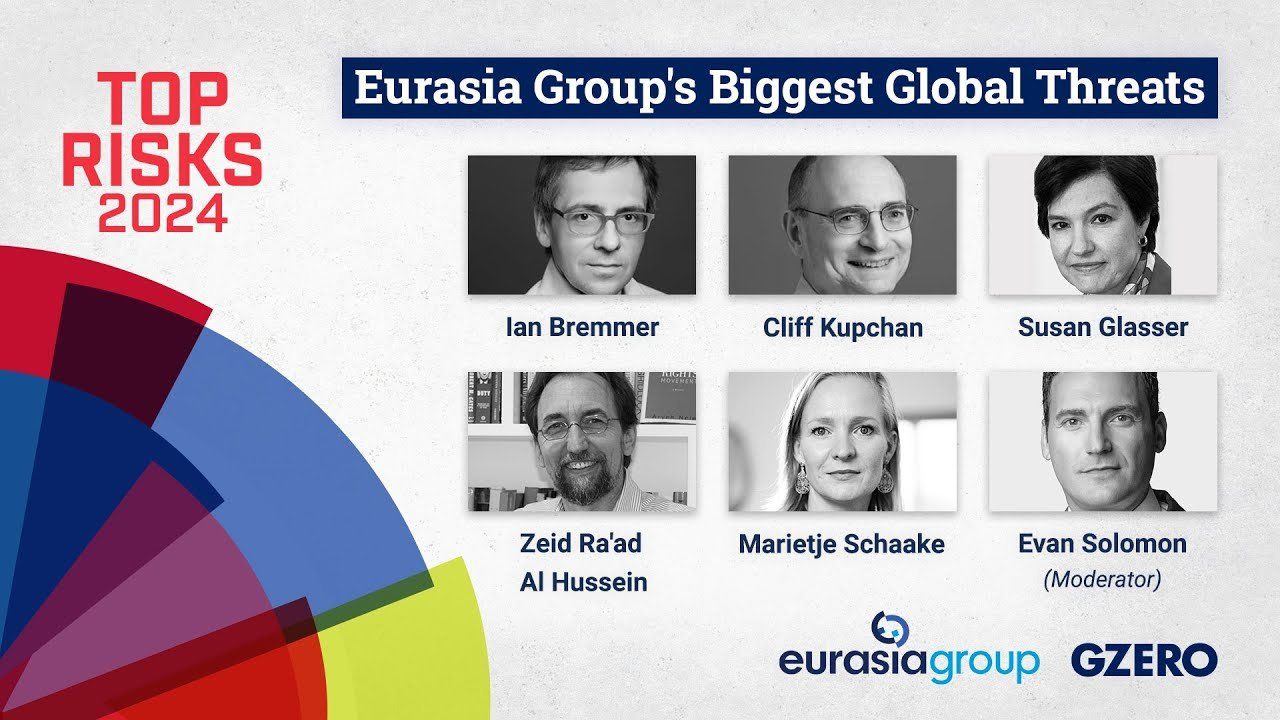
2024 is shaping up to be a turbulent year. The war in Ukraine is heading into a stalemate that puts the country on the road to partition. Israel's invasion of Gaza risks expanding to a region-wide war. And in the United States, the presidential election is pitting a divided country against itself with unprecedented risks for its democracy. Throw in AI growing faster than governments can keep up, China's rumbly grumbly economy, and El Nino weather, and you're starting to get the picture.
All those trends and more made it onto Eurasia Group's annual Top Risk project for 2024. As a political risk consultancy, Eurasia Group strives to keep clients informed of the global affairs that will impact their interests and bottom lines. The Top Risks project takes the view from 30,000 feet every year, summarizing the biggest and most dangerous unknowns that will affect everyone, political junkie or not.
GZERO Publisher Evan Solomon sat down with Eurasia Group Founder and President Ian Bremmer and Chairman Cliff Kupchan to work through their list of Top Risks for 2024 alongside Susan Glasser, staff writer at The New Yorker and co-author of "The Divider: Trump in the White House, 2017-2021"; Zeid Ra'ad Al Hussein, CEO & President of the International Peace Institute and former United Nations High Commissioner for Human Rights; and Marietje Schaake, International Policy Fellow, Stanford Human-Centered Artificial Intelligence. The big throughline this year? Events spiral out of control even against the wishes of major players. Whether it's possible escalation between Israel and Iranian proxies, Chinese retaliation to the result of the Taiwanese election, or central banks finding themselves squeezed into a corner by persistent inflation, the sheer number of moving parts presents a risk in and of itself.
Take a deep dive with the panel in our full discussion, livestreamed on Jan. 8.
- Will China end Russia’s war? ›
- The AI power paradox: Rules for AI's power ›
- Accelerating Sustainability with AI: A Playbook ›
- Top Risks 2023: A rogue Russia and autocrats threatening the world ›
- Eurasia Group’s Top Global Risks 2024 ›
- 2024's top global risks: The trifecta of wars threatening global peace - GZERO Media ›
- What would a second Trump term mean? Think Jurassic Park - GZERO Media ›
- Trump's immunity claim: US democracy in crisis - GZERO Media ›
- Pakistan-Iran attacks: Another Middle East conflict heats up - GZERO Media ›
- AI regulation means adapting old laws for new tech: Marietje Schaake - GZERO Media ›
- 2024 is the ‘Voldemort’ of election years, says Ian Bremmer - GZERO Media ›
- Podcast: Trouble ahead: The top global risks of 2024 - GZERO Media ›
- Ian Bremmer's 2024 State of the World speech: Watch live Tuesday at 8:30 pm ET - GZERO Media ›
- The challenges of peacekeeping amid rising global conflicts - GZERO Media ›
- Live on Jan. 6: the Top Risks of 2025 - GZERO Media ›